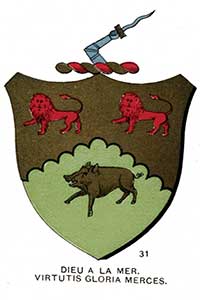The MacDonough or MacDonagh Family

(Crest No. 31. Plate 11.)
THE MacDonough family is descended from Milesius, King of Spain, through the line of his son Heremon, and belonged to the Hy Brune tribe. The founder of the family was Muiredach or Mulrooney or Rooney Mullethan, King of Connaught in the seventh century.
The ancient name of the family was O’Connor, which signifies “Grandson of Helper.” The title of the chiefs was Lord of Tiberill and Tuir Olliol.
The possessions of the sept were in the County of Sligo and comprised the present barony of Corran. There was an offshoot of this family also in the County of Clare and a MacDonough branch, the chiefs of Duhalla, in the present barony of Duhallow, in the County of Cork. These MacDonoughs were a branch of the MacCarthys and were styled princes of Duhallow; their chief residence was the magnificent Castle of Kanturk.
The MacDonoughs having been deprived of their estates by the English a large number of the sept crossed the Channel and entered the military service of France. From the year 1690 to 1770, forty-two members of the MacDonough family served as officers in Dillon’s Regiment, Irish Brigade, and at the battle of Cremona three brothers of that name distinguished themselves in the same regiment. Other noted officers of this sept served in the other regiments of the brigade and signalized themselves on many a well-contested field.
At the battle of Fontenoy as the Irish approached the British, an officer of the brigade, Anthony MacDonough, being in advance of his men, was singled out and attacked by a British officer. MacDonough soon disabled his adversary in the sword arm and making him prisoner sent him to the rear. “This rencontre,” writes O’Callaghan, “in the presence of both forces, occasioned a momentary pause, followed by a tremendous shout from the brigade at the success of their own officer, the effect of which could only be felt by a spectator, and, at such a critical juncture, that startling shout and the event of ill omen to the British with which it was connected were remarked to have a proportionable influence upon them.” These two gentlemen afterward became fast friends.
Another notable member of this family in France was Lieutenant-Colonel MacDonough of the Sixtieth Regiment of Infantry and Chevalier of the Royal and Military Order of St Louis. Through a conspiracy on the part of his wife and her relatives to defraud him out of his inheritance, he was imprisoned under a lettre de cachet procured from the French War Minister through bribery and woman’s intrigue. He was confined behind six triple-grated gates for twelve years and seven months in the same dungeon in which was imprisoned the famous “Man with the Iron Mask,” and deprived of all communication with the outer world. He was released by the Revolution and compensated by suitable military advancement.
In the history of the United States also this name is honorably recorded. Commodore Thomas MacDonough, who distinguished himself at the attack on Tripoli and at Gibraltar, in 1806, retaking impressed American seamen from the British, and who almost annihilated a British naval force on Lake Champlain with an inferior and hastily improvised fleet, September 11, 1813, was a descendant of this family. The British in that contest had four ships and thirteen galleys, mounting ninety-five guns; McDonough four ships and eleven galleys, mounting eighty-six guns, one of his vessels having been built of trees cut down on the bank twenty days previously. After a prolonged and bloody fight McDonough utterly crushed the enemy through his superior seamanship and the skillful manner in which he maneuvered his vessel. For this action Vermont and New York voted him large tracts of land and Congress presented him with a gold medal and promoted him to a captaincy. James McDonough, brother of Thomas, signalized himself during the action between the United States ship “Constellation” and the French frigate “L’Insurgente”; he had his foot shot off during the fight and was in consequence compelled to retire from the navy. Major McDonough, their father, settled in Newcastle, Delaware, a few months before the birth of the future commodore.

COMMODORE THOMAS McDONOUGH,
At the Battle of Lake Champlain.
